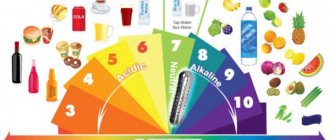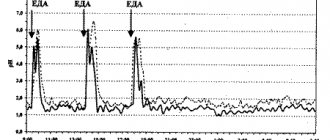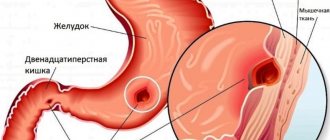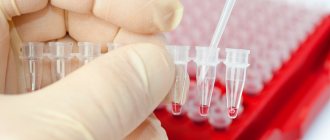At this point in time, much attention is paid to diseases associated with high stomach acidity. At the same time, many people forget about such a problem as low stomach acidity (hypochlorhydria) and its effect on digestion.
The normal course of the digestion process directly depends on the amount of hydrochloric acid, and a special gland located in the mucous membrane is responsible for its production in the human body. If the acidity of the stomach is reduced, then this provokes many health problems.
What causes acidity levels to decrease? How to distinguish high acidity from low acidity?
Causes of hypoacid gastritis
The reasons due to which this disease appears can be external and internal.
External ones include:
- abuse of tobacco products and alcoholic beverages;
- improper diet, spicy, fried, fatty, smoked foods;
- abuse of medications with side effects on the gastric mucosa;
- harmful effects of chemicals and radioactive substances;
Internal include:
- gastrointestinal pathologies and disorders of the immune system;
- impaired metabolism, liver, pancreas and thyroid glands;
- various genetic abnormalities in the development of the mucous membrane.
Hypoacid gastritis most often affects adults and males. Children and women are less susceptible to this disease.
Traditional medicine
Traditional medicine also offers recipes that help normalize the level of acidity in the stomach. Of course, if the disease is protracted, then they are unlikely to be able to completely replace enzymatic therapy, but in the early stages of the development of such gastritis, recipes based on natural ingredients will be able to cope with the problem.
If the acidity level is low, you can use plantain juice. This is the simplest remedy. To prepare it, you should collect the leaves of the plant, wash them thoroughly, and then use a juicer. You can simply rub the leaves through a meat grinder and then squeeze out the juice through cheesecloth. You should drink this liquid every time before meals. By the way, plantain leaves can be added to various salads. This will only improve the patient’s well-being within a couple of days.
Every day you should drink a glass of warm water, in which a spoonful of honey is pre-mixed. This not only has a beneficial effect on the functioning of the stomach, but also helps better digestion. The drink should be consumed 30 minutes before meals. You can brew dry raspberry leaves, viburnum, rose hips, and aloe.
Symptoms and signs of the disease
The symptoms of such gastritis are associated with the severity of the disease. At the very beginning, they may not be noticeable at all. But later complaints with hypoacid gastritis are as follows:
- pain in the upper abdomen (sometimes radiating under the ribs on the left side);
- feeling of discomfort (feeling of heaviness, bloating);
- belching “rotten eggs”, metallic taste in the mouth, tongue with a gray coating;
- poor appetite;
- frequent diarrhea or constipation;
- nausea, excessive salivation;
- chronic fatigue, headaches, low performance;
- weight loss, changes in sleep patterns.
During a severe exacerbation, other signs may be added: rapid heartbeat, fainting.
Etiology
The cause of this pathological process may be the following factors:
- a history of infectious diseases;
- acute gastritis;
- dysentery;
- poor nutrition, which consists of abuse of fast food, dry food, snacks on the go;
- abuse of alcoholic beverages and surrogates;
- prolonged fasting or following a diet that is unsuitable for the body;
- passive lifestyle;
- lack of physical activity;
- long-term treatment or uncontrolled use of medications;
- frequent food poisoning.
It should also be understood that none of the above etiological factors is a 100% predisposition to the development of such a pathological process, but under certain factors it can become the main cause.
Zero acidity in the stomach leads to slow digestion. In addition, in people with this pathological process, atrophy of the mucous membrane begins, which leads to disruption of the production of gastric juice.
How to diagnose hypoacid gastritis
If you notice similar symptoms, you should consult a specialist in the field of gastroenterology for diagnosis. To determine the clinical picture and make a correct and accurate diagnosis, the doctor usually conducts an examination, finds out complaints and prescribes tests and studies, as a result of which the type of pathology and how affected the gastric mucosa is determined. To determine chronic hypoacid gastritis use:
- visual examination of the stomach using a gastroscope (gastroscopy);
- endoscopic biopsy (taking material for biopsy);
- pH-metry of the acidity of secreted gastric juice;
- blood tests and coprogram.
Having collected a complete picture as a result of instrumental and laboratory studies, the doctor proceeds to drawing up a treatment program.
Pathogenesis
The level of acidity is an important indicator on which the digestive process depends. The main component of gastric juice is hydrochloric acid, which is present in various parts of the gastrointestinal tract. Its concentration should be different in all zones.
Acidity can be normal, low or high. Zero coefficient is the lowest limit of acidity.
Do not self-medicate under any circumstances, otherwise the recovery process will be long and extremely painful. Hydrochloric acid plays the role of an indicator of the acidity of gastric juice. When it is at zero, proper disinfection of the food mass does not occur. This disrupts the intestinal microflora and also provokes the active proliferation of pathogenic microorganisms.
The main clinical picture with zero acidity of gastric secretion:
- frequent constipation is observed. Due to reduced intestinal motility, food debris is not able to be evacuated quickly and completely;
- release of toxins, causing discomfort and pain, especially after eating;
- lack of appetite;
- metallic taste in the mouth;
- bad breath caused by rotting food;
- a peculiar viscosity prevails in the oral cavity due to the restructuring of the saliva structure;
If there is pain, fever and nausea, then the pathology has worsened and spread. Having discovered the listed signs, you should consult a doctor to begin direct treatment of the disease.
Hypoacid gastritis: treatment
The treatment of such gastritis is based on an integrated approach using various methods and medications acting in different directions.
- To return the functioning of the digestive system to normal, replacement therapy is used (preparations of natural gastric juice, hydrochloric acid, enzymes).
- Antispasmodics are used to relieve pain.
- If, based on research results, Helicobacter pylori was detected in the body, then antibiotics are prescribed.
- Impaired metabolism during gastritis leads to a lack of nutrients, so vitamin complexes containing B vitamins and folic acid are prescribed.
- Probiotics are used to restore intestinal flora.
Medicines for hypoacid gastritis should be used strictly as prescribed by the doctor, since deviation from the regimen may disrupt the course of treatment. An important factor during treatment is diet. In this case, the patient is assigned to table No. 2, where rough and indigestible food, very hot and cold dishes are excluded from the diet. In addition, if the secretion of hydrochloric acid decreases, milk consumption should be reduced, replacing it with fermented milk products. Portions should be small, but 6 times a day. As an auxiliary treatment, traditional medicine is possible, which is also best agreed upon with the treating specialist. The most commonly used are decoctions of rose hips, blueberries, and mixtures of aloe and honey.
Drugs
To eliminate digestive problems, the patient is prescribed enzyme preparations. Zero acidity can be eliminated by using enzymes that improve digestion. The use of medicinal herbs has a good effect, but for greater effectiveness these remedies must be used for a long period of time and often repeat the course of therapy. Doctors also use drugs that can replace hydrochloric acid.
Anacidic gastritis cannot be ignored, since without timely treatment the disease becomes severe, the process of eating becomes more complicated and there is a possible risk of complications.
Popular questions about hypoacid gastritis
How to determine low stomach acidity?
Only pH-metry can give an accurate determination of acidity. But you can suspect its low level if you can safely eat sour lemon.
How to distinguish gastritis with high and low acidity?
There are certain signs that characterize different types of acidity. If it is heartburn or sour belching, then most likely this indicates increased acidity. Low blood pressure is characterized by belching with the smell of rotten eggs, which indicates poorly digested food.
What should you not eat if you have gastritis with low acidity?
If such gastritis is detected, it is better to forget about smoked, fatty, spicy foods, fermented cheeses, chocolate, coffee and carbonated drinks.
Healing exercise
When treating zero acidity, physical exercise plays a significant role, which helps to establish normal functioning of the stomach and increase the level of chloride acid produced. There are no difficulties in performing the exercises; it is enough to periodically make rotational movements to the sides with your limbs bent at the knees. The position during this exercise should be horizontal with the buttocks pressed to the floor. You need to place your arms along your body and tighten your abdominal muscles.
A good effect is obtained after performing an exercise called “cat stance”. To do this, lie on your stomach and rest your palms on the floor at chest level. The torso must be periodically raised up, alternately bending the back down and straightening it up. You need to repeat this exercise 20 times. Bends of the torso in all directions and squats will be useful. When performing therapeutic exercises, you should not overload yourself and strain your abdominal muscles.
Contraindications to the procedure
Among the contraindications to pH-metry are:
- gastrointestinal bleeding;
- aortic aneurysm;
- bleeding disorders;
- severe course of coronary heart disease;
- narrowing of the lumen of the esophagus;
- hypertensive crisis and the possibility of an uncontrolled increase in pressure.
The study is carried out with caution in people who have tumors, erosions or varicose veins of the esophagus.
When performing measurements, various stimulants and inhibitors of gastric secretion are often used. This makes it possible to evaluate changes in acidity under different circumstances. If a person has contraindications to the use of baking soda, then it becomes impossible to conduct an alkaline test.
A healthy lifestyle to protect your stomach health
It has long been no secret that it is impossible to consider the state of any organ in isolation from the body, because all systems are closely interconnected. That is why general health can help the stomach return to “normal” as quickly as possible.
If you want to forget about problems with acidity, then in addition to traditional treatment, engage in complete recovery - stop smoking, drinking alcohol, try to avoid stress, adjust your wakefulness and sleep patterns, move more, spend enough time in the fresh air.
Zero stomach acidity is a very serious disorder that requires immediate treatment, because complications can be quite serious. But if you are attentive to your body and consult a doctor in a timely manner, improvement will not take long. Be healthy!
Drug therapy
Nolpaza - reduces acidity.
The following drugs help reduce stomach acidity:
- Antihistamines: Ranitidine, Kvamatel, Famotidine. Their cost is quite low. The duration of use is limited because they affect hormones.
- Controloc, Nolpaza, Omeprazole are medications that reduce acidity.
- Antacids are neutralizers of excess acid. There are Almagel, Maalox, Phosphalugel. Soda, chalk, and magnesia also effectively reduce acidity.
- Motilium and Domidon also help in moving food into the intestines.
- To restore the gastric mucosa, probiotics and enzymes are prescribed: Mezim, Festal.
All these drugs are taken in combination with the following drugs: Smecta, flax seed, white clay. Such products have an enveloping effect.
Indications for pH testing
This diagnostic test is used for:
- presence of heartburn, sour taste in the mouth or belching;
- chronic gastritis;
- Barrett's esophagus;
- gastroesophageal reflux;
- peptic ulcer disease.
pH-metry is also used to determine the effectiveness of treatment and assess the condition after gastrectomy. The procedure has contraindications, so before prescribing it, the doctor must conduct an initial examination and study the medical history.
Prevention
It is impossible to completely exclude the development of this pathological process, but you can minimize the risk of development if you apply the following in practice:
- monitor your diet - it should be balanced for the body, food should be consumed in a timely manner and in a calm environment;
- gastroenterological diseases need to be treated correctly and in a timely manner - this will help to avoid associated complications;
- If possible, you need to protect yourself from stress and psycho-emotional stress.
In addition, it is rational to systematically carry out preventive examinations with a gastroenterologist and other highly qualified medical specialists. Such measures will help to diagnose the disease in a timely manner or prevent its development altogether.










